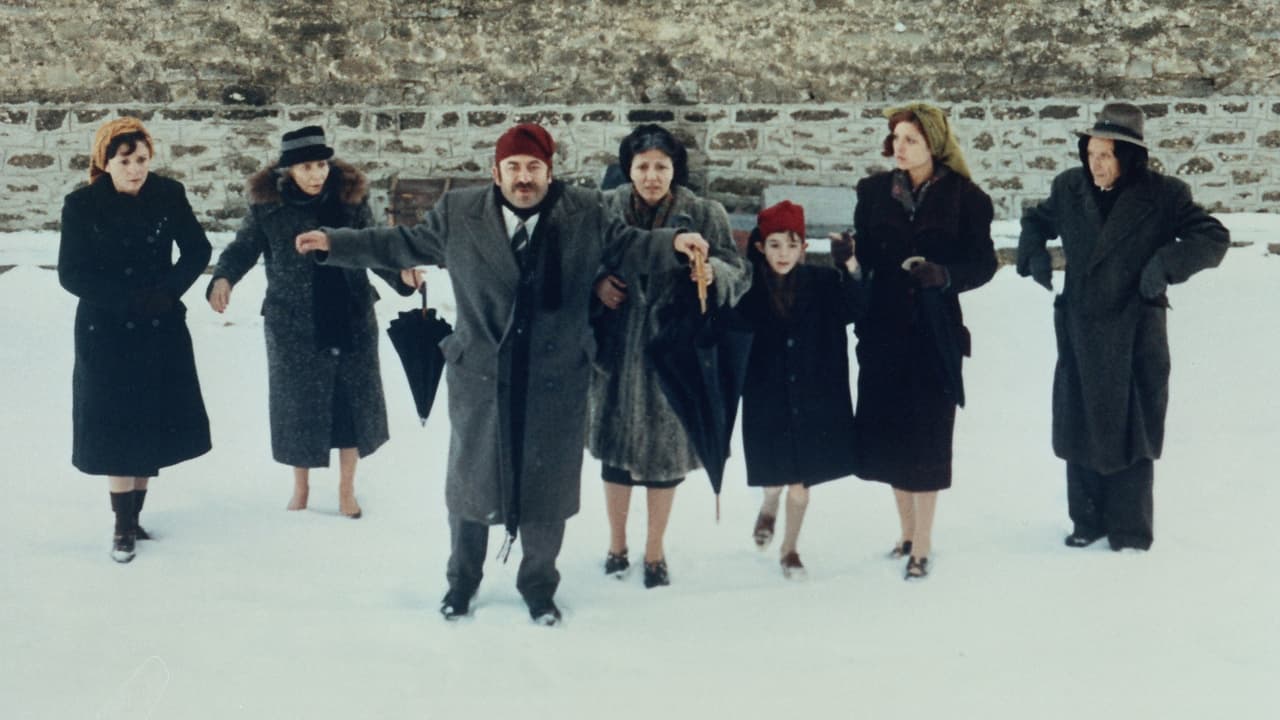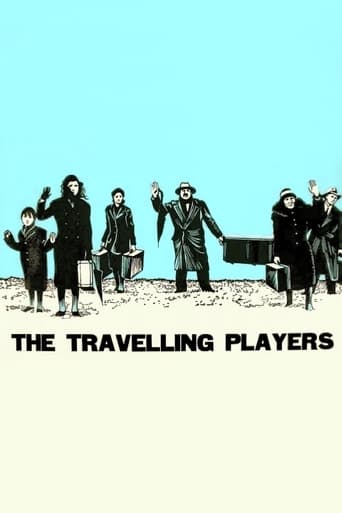

The Travelling Players is possibly the greatest movie in the history of Greek cinema. It is directed by the world-renowned Greek director Theo Angelopoulos and it presents the life in Greece from 1939 to 1952 through a family of travelling provincial players. It explores the political history of Greece during a very dramatic period, that includes dictatorship, the WWII outbreak, the Italian invasion and the subsequent German occupation and it continues with the liberation of the country and the very bloody Civil War. The Travelling Players was a very controversial movie. The film was to participate officially in the Cannes Film Festival, but the conservative Greek government, sought (and failed) to prevent this to happen, because the film tells the modern Greek history through a left- Marxist perspective.Angelopoulos proves that he's a master filmmaker on every level. From direction and writing to every technical aspect. Cinematography in particular.Also, the music by Loukianos Kilaidonis is fantastic and elevates the film in a different level.The Travelling Players is a masterpiece that everyone should watch.
... View MoreI would not have known about this Greek film if it had not been featured in the book 1001 Movies You Must See Before You Die, it was rated well by critics as well, so I hoped it was worth it, directed by Theodoros Angelopoulos (Landscape in the Mist). Basically a group/troupe of travelling players, i.e. stage performers, travel through Greece attempting to perform the popular erotic drama Golfo the Shepherdess. The film is a trawl through historical events between 1939 and 1952, as experienced by the travelling players, these events affect all villages they visit, hence the performance of the play is not always successful or completed. The historical events seen are the last year of the dictatorship of fascist prime minister Ioannis Metaxas, the war between Greece and the Italians, the occupation of the Nazis, the liberation, the civil war between left and right wingers and the intervention of Greek politics by the British and the Americans. The film is also seeing the lives of the characters themselves, with jealousy and betrayal more, this includes Aegisthus (Vangelis Kazan) is an informer and collaborator working with German occupiers, and Orestes (Petros Zarkadis) fighting with the leftists, avenges the death of his father by killing his mother and Aegisthus, he is arrested for guerrilla activities and executed in prison. Orestes's sister Elektra (Eva Kotamanidou) helps the leftists and aids her brother in his vengeance, after his death he continues the work of the troupe and her relationship with Pyladis (Kiriakos Katrivanos), Elektra's younger sister Chrysothemis (Maria Vassiliou) collaborates with the Germans, becomes a prostitute during the occupation, during the liberation sides with the British, and later marries an American. Orestes's close friend Pyladis is a communist exiled by the regime of Metamax, he joins the guerrillas and gets arrested and is exiled again, finally after being tortured he is forced to sign a denunciation of the left by the right wing and he is released from prison a few years later. Also starring Stratos Pachis as Agamemnon, Aliki Georgouli as Elektra's Mother, Stratos Pahis as Elektra's Father, Giannis Fyrios as Accordionist and Grigoris Evangelatos as Poet. To be honest, most of the description above is not written by me, it was for me a rather complicated film, I got the parts of the players trying to perform their play while history goes on in the background, and some of the character stories caught my attention a little, but there were loads of slow moments with no dialogue and not much action, critics are right when they said you need patience to watch this film, I don't think I had enough for it, especially it being almost four hours long, but it's not a bad epic political drama. Worth watching!
... View MoreSixteen years of civil war and social unrest follow a small band of itinerant actors, who offstage are a reluctant audience to the much larger drama of current events. Director Theodoros Angelopoulos is virtually unknown in this country, and it might be a simple question of stamina: this four-hour long Greek tragedy is certainly impressive, but it's also a motion picture deprived of its requisite motion. Angelopoulos favors long takes with extended tracking shots, and seems to be stubbornly opposed to any idea of creative editing. The technique sometimes works, for example when a scene shifts years forward in time within a single, sustained shot, or when the director places what little action there is behind a static camera, focused instead on a neutral image, perhaps a brick wall or a beach at low tide (imagine the masterpiece he could have made by leaving the lens cap on as well). The effect can be hypnotic, but anyone who thinks filmgoing was meant to be an invigorating experience will likely find it a monument to tedium.
... View More"The Travelling Players", one of the early films of Theo Angelopoulos, shows the vast difference between the talented rising director of 1975 that had something to say, and of the bourgeois famous director of 1998 ("Eternity And A Day") that won the Cannes award but had nothing left to say.A sprawling epic running at around 4 hours, the film follows a group of touring actors performing a theatrical play across Greece between 1939 and 1952. The focus is on the troubled modern history of Greece during the period (a fascist dictatorship, resistance against the Italians, German occupation, civil war), seen through a series of warped desolate sequences drenched in languor, and also an apotheosis of traditional folklore, music, theater, rural and urban landscapes. Most of these scenes exhibit a rare poetical sensibility, while a few are a bit clumsy, but still interesting.Couple that with the drama that unfolds within the group of players, and you've got a true masterpiece. Basically what we see is a loose adaptation of Aeschylus' ancient tragedy "Oresteia" (the father Agamemnon, the adulterous mother Clytamnestra, her lover Aegisthus, the avenging daughter Elektra, the avenging son Orestes etc). In the end, the group of actors stands severely rearranged through a painful and dividing historical period, shadows of themselves in a shadow of a country. The film ends as a perfect circle just the way it began, a metaphor for life itself.
... View More